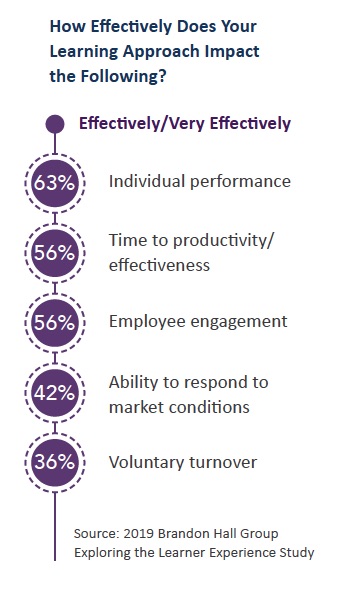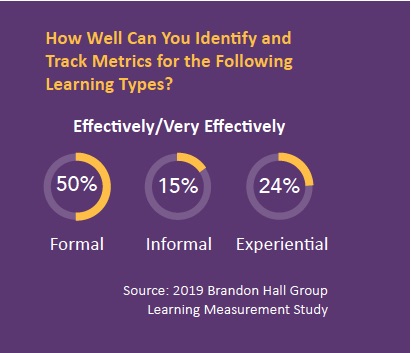Organizations spend an enormous amount of time, money, and energy training and developing their workforce, but most are not really sure what they are getting in return.
In fact, according to Brandon Hall research, less than two-thirds believe their learning is either effectively or very effectively impacting individual performance. Even fewer believe they are impacting things such as employee engagement, turnover, or the business’s ability to respond to market conditions.

Learning continues to occur in a vacuum with only the most tenuous connection to the business. Programs are demanded, Learning and Development (L&D) creates and delivers them, and everyone gets a pat on the back if more than 80 percent of employees finish them. But it all starts with a strategy, and only 40 percent of companies say their learning strategy is well-defined and just 27 percent say their strategy includes a framework to measure success.
Companies must do a better job aligning the learning strategy with the business. It is not a static, one-time exercise. All organizations are prone to frequent change. Learning must stay ahead of the changes and support the business as it evolves. Currently, only 44 percent of companies are optimistic about their abilities to develop the skills they will require in the future.

Companies are faced with an increasingly busy and distracted workforce. And thanks to technology such as smartphones and Google, people are accustomed to having access to whatever knowledge and information they need, whenever they need it. The infrastructure and organizational structure for learning at many companies may not be designed to meet this need. Organizations are accustomed to dealing with traditional, predominantly event-based learning strategies.
The same restraints keep companies from measuring the impact of more modern learning efforts. There are many reasons companies aren’t measuring learning’s impact on performance or business results, but only 4 percent say it’s because there is no need. Other reasons include:
- It is too difficult to assess.
- It is too difficult to link learning to outcomes.
- We don’t have the proper metrics.
- We don’t have the time/staff.
- We don’t have the technology to support it.
To combat these challenges, organizations must deal with many competing priorities. When asked which areas of L&D would receive heavy investment in 2020, there is a virtual tie among the top five:
- Learning organizational structure and governance
- Linking learning to performance
- Technology implementation
- Collaborative learning
- Understanding/implementing artificial intelligence (AI) and machine learning
The Struggle
The consequences of being unable to manage the complexities of L&D are stark and wide-reaching. Brandon Hall Group research found just 35 percent of companies believe their L&D strategy is either effective or very effective in helping the organization achieve its business goals. If L&D isn’t helping the business, what is it doing?
Until organizations learn how to properly develop their workforce in a contextual, adaptable environment focused on results, they will continue to struggle with missed business goals, skills gaps, high turnover, and low employee engagement. One thing that separates Millennials and Generation Z from other generations in the workforce is that they have shown to be willing to walk away from a job if they feel like they are not being given enough development opportunities.
Many organizations will witness the culmination of their digital transformation over the next 10 years. If the Learning function is not ahead of that transformation, companies will find themselves at a significant disadvantage. L&D has to be a central agent of change throughout the transformation, ensuring people have the skills and knowledge to carry the organization through to its future state and beyond.
Endless Challenges
The people, processes, and technology that make up the Learning function create a complex environment that presents endless challenges for organizations. The critical questions companies must answer include:
- How do we align the learning strategy with the business?
- How do we create and deliver a personalized learning experience at scale?
- Which technologies are required to execute on our strategic vision?
- How do we foster and sustain a culture of continuous learning?
- How can we ensure and demonstrate that learning is having a positive impact on business results?
Brandon Hall Group Point of View
Organizations must stop paying mere lip service to the transformation of learning and break out of the traditional practices, processes, and infrastructure that keep them from moving forward. Brandon Hall Group’s assessment of the state of learning and development brought us to some essential strategies for a future of impactful learning. One of the most crucial is to develop a top-down culture of continuous learning
While most aspects of human capital—learning included—focus on bottom-up innovation and collaboration, senior leadership must embrace the concept of continuous learning. We have seen success from companies where leadership participates in and promotes new learning opportunities. Employees want to know the time they spend on learning is valuable to their job and the company, and leadership buy-in goes a long way in doing that.
To download a free copy of Brandon Hall Group’s 2020 HCM Outlook Book: The Future of the Employee Experience, click here.
David Wentworth is principal learning analyst at Brandon Hall Group. The firm’s vision is to inspire a better workplace experience, and its mission is to empower excellence in organizations around the world through its research and tools. Brandon Hall Group has five HCM practices and produces the Brandon Hall Group HCM Excellence Awards and the annual HCM Excellence Conference, in West Palm Beach, FL.



